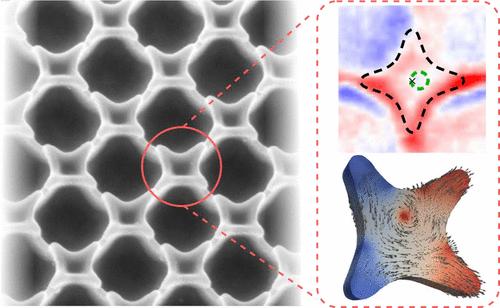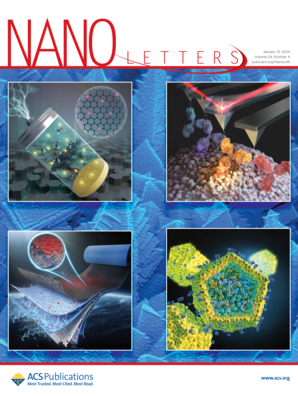Magnetic Solitons in Hierarchical 3D Magnetic Nanoarchitectures of Nanoflower Shape
IF 9.1
1区 材料科学
Q1 CHEMISTRY, MULTIDISCIPLINARY
引用次数: 0
Abstract
Curvilinear magnetism emerged as a new route to tailor properties of magnetic solitons by the choice of geometry and topology of a magnetic architecture. Here, we develop an anodized aluminum oxide template-based approach to realize hierarchical 3D magnetic nanoarchitectures of nanoflower shape. The technique provides defect-free regular arrays of magnetic nanoflowers of tunable shape with a period of 400 nm over cm2 areas. We combined advanced magnetic imaging methods with micromagnetic simulations to study complex magnetic states in nanoflowers originating due to magnetostatics-driven symmetry break in curvilinear nanomembranes. An interaction between surface and volume magnetostatic charges in 3D curved nanoflowers leads to the stabilization of asymmetric and shifted vortices as well as states with two Bloch lines. Ordered large area arrays of complex-shaped magnetic nanoarchitectures developed in this work are relevant for prospective research on 3D magnonics and spintronics.

纳米花形状分层三维磁性纳米结构中的磁孤子
曲线磁性是通过选择磁性结构的几何形状和拓扑结构来定制磁孤子特性的新途径。在这里,我们开发了一种基于阳极氧化铝模板的方法,以实现纳米花形状的分层三维磁性纳米架构。该技术可在平方厘米的区域内形成无缺陷、周期为 400 nm、形状可调的规则磁性纳米花阵列。我们将先进的磁成像方法与微磁模拟相结合,研究了纳米花中的复杂磁态,这些磁态是由于磁静力学驱动的曲线纳米膜对称性断裂而产生的。三维曲面纳米花中表面和体积磁静电荷之间的相互作用导致不对称和移位涡流以及具有两条布洛赫线的状态趋于稳定。这项工作中开发的有序大面积复杂形状磁性纳米结构阵列与三维磁学和自旋电子学的前瞻性研究息息相关。
本文章由计算机程序翻译,如有差异,请以英文原文为准。
求助全文
约1分钟内获得全文
求助全文
来源期刊

Nano Letters
工程技术-材料科学:综合
CiteScore
16.80
自引率
2.80%
发文量
1182
审稿时长
1.4 months
期刊介绍:
Nano Letters serves as a dynamic platform for promptly disseminating original results in fundamental, applied, and emerging research across all facets of nanoscience and nanotechnology. A pivotal criterion for inclusion within Nano Letters is the convergence of at least two different areas or disciplines, ensuring a rich interdisciplinary scope. The journal is dedicated to fostering exploration in diverse areas, including:
- Experimental and theoretical findings on physical, chemical, and biological phenomena at the nanoscale
- Synthesis, characterization, and processing of organic, inorganic, polymer, and hybrid nanomaterials through physical, chemical, and biological methodologies
- Modeling and simulation of synthetic, assembly, and interaction processes
- Realization of integrated nanostructures and nano-engineered devices exhibiting advanced performance
- Applications of nanoscale materials in living and environmental systems
Nano Letters is committed to advancing and showcasing groundbreaking research that intersects various domains, fostering innovation and collaboration in the ever-evolving field of nanoscience and nanotechnology.
 求助内容:
求助内容: 应助结果提醒方式:
应助结果提醒方式:


